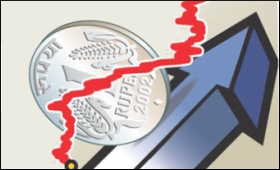|
|
|

|
Retail inflation declines to 4.06% in January
|
|

|
|
| Top Stories |
 |
|
|
|
SME Times News Bureau | 12 Feb, 2021
Lower food prices, especially those of vegetables and cereals, brought
down India's sequential retail price inflation in January 2021.
Sequentially,
the Consumer Price Index (CPI), which gauges the retail price
inflation, declined to 4.06 per cent from 4.59 per cent reported for
December 2020.
Besides, the data furnished by the National
Statistical Office (NSO) showed that CPI Urban declined to 5.06 per cent
in January from 5.19 per cent in December.
The CPI Rural fell to 3.23 per cent last month from 4.07 per cent in December 2020.
As per the data, the Consumer Food Price Index decreased to 1.89 per cent last month from 3.41 per cent in December.
The CFPI readings measure the changes in retail prices of food products.
On
a YoY inflation rate, prices of vegetables declined by 15.84 per cent
and the sub-category of sugar and confectionery by 0.26 per cent.
However,
prices of cereals and products and pulses and products rose by 0.07 per
cent and 13.39 per cent, respectively, in December.
Furthermore, meat and fish prices increased by 12.54 per cent and eggs became dearer by 12.85 per cent.
In addition, the fuel and light category under the CPI rose by 3.87 per cent.
"Driven
by a fairly broad-based moderation in the food inflation, the CPI
inflation in January 2021 softented appreciably to a 16 month low 4.1
per cent, similar to our forecast (4.2 per cent)," said ICRA's Principal
Economist Aditi Nayar.
"However, in an uncomfortable trend, many
of the non-food categories recorded a rise in inflation in January
2021. With inflation expected to resume an uptrend in February-March
2021, we do not think that today's softer-than-anticipated print creates
the room for an imminent rate cut."
Furthermore, Nayar said the food prices have displayed a mixed trend so far in February 2021.
"The
rise in onion prices, as well as higher crude oil prices and their
transmission into retail fuel prices are areas of concern that need to
be monitored."
"Unless a cut in indirect taxes on fuels results
in a sharp softening of the inflation trajectory, we expect the rate cut
cycle to have ended."
Sunil Kumar Sinha, Principal Economist,
India Ratings and Research, said: "Strong base effect in vegetable
prices will keep food inflation low over the next six to nine months,
however, a spike in vegetable prices during the summer months can't be
ruled out."
"Increase in crude prices coupled with high taxes on
petroleum products has resulted in fuel and light inflation increasing
to 10-months high of 3.87 per cent in January 2021. In the FY22 budget,
taxes and duties on petroleum products have remained the same."
Suman
Chowdhury, Chief Analytical Officer, Acuite Ratings & Research,
said: "This declining trajectory has been driven by a sharp drop in
vegetable prices which had held high for an extended period due to
supply chain and adverse weather challenges in the earlier part of the
year."
Nevertheless, Chowdhury said the inflation in animal protein products, edible oils and pulses continue to be in double digits.
"Further,
the data indicates that some components of core inflation such as
transport and communication are on a rise which reflect the potential
inflationary pressures in the economy."
"With the rise in fuel
prices, there is a risk of a sustained increase in core inflation amidst
the ongoing economic revival. We expect RBI to remain cautious on the
inflationary front and accordingly, calibrate its liquidity management
policy."
|
|
|
| |
|
|
|
|
|
|
|
|
|
|
|
|
|
|
| |
| Customs Exchange Rates |
| Currency |
Import |
Export |
US Dollar
|
84.35
|
82.60 |
UK Pound
|
106.35
|
102.90 |
Euro
|
92.50
|
89.35 |
| Japanese
Yen |
55.05 |
53.40 |
| As on 12 Oct, 2024 |
|
|
| Daily Poll |
 |
 |
| Will the new MSME credit assessment model simplify financing? |
|
|
|
|
|
| Commented Stories |
 |
|
|
|
|
|
| |
|